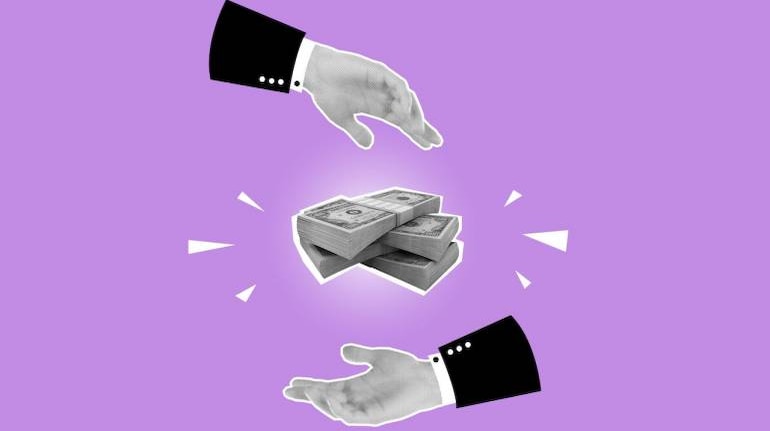



When retired Indian Institute of Management Bangalore professor R Vaidyanathan's book Black Money and Tax Havens first came out in 2017, it was right on the heels of India's massive demonetization drive (announced November 8, 2016, to replace existing Rs 500 and Rs 1,000 notes with new currency notes), and conversation around black money - what it is, its impact on the larger economy, whether it was funding illegal activities and how to bring it back to India- was everywhere.
 254 pages; Rs 399.
254 pages; Rs 399.
As Penguin Random House bring out an updated edition of the book, some of the same concerns around black money and tax havens persist. In the following excerpt from the book, R. Vaidyanathan details some ways to address the issue and bring black money back into India:
There are four ways in which the black money can be brought back to India:
l. Do as the Americans did—jail the highest ranking official of an international bank in India. Begin by asking them for the details of the bank accounts of all Indians with their bank. If they refuse, put them in jail. This was done to the Swiss by the US and they complied within two days.
2. Like Germany, India can bribe a high-ranking official of an international bank and get the information from a tax haven such as Liechtenstein Bank. The French did the same thing to HSBC.
3. Using DTAA (Double Taxation Avoidance Act), a small part of the black money can be recovered by exchanging information between sovereign tax authorities. Only future violations will be attracted by this way.
4. According to a UN resolution, if any country wants the details of all the holdings of its citizens in tax havens, then the country has to pass a law nationalizing their assets abroad. Once this law is passed, the UN resolution can be used to get the details of the accounts from any tax haven. The Philippines, Egypt and Libya have already taken this approach.
The United Nations Convention against Corruption (UNCAC) is a landmark, international anti-corruption treaty adopted by the UN General Assembly in October 2003. It represents a remarkable achievement: a global response to a global problem. With 145 countries bound by UNCAC so far, it is unique not only in its worldwide coverage but also in the extent of its provisions, recognizing the importance of both preventive and punitive measures. Of all the chapters in this document, the one that deals with illegal assets is detailed in Chapter 5 of the document—in the section on asset recovery. While Chapter 5 waxes eloquent by laying a framework for countries to adapt both their civil and criminal law in order to facilitate tracing, freezing, forfeiting and returning funds obtained through corrupt activities, it leaves the door open in terms of tackling political corruption, i.e., the acquisition of illegal assets of Politically Exposed Persons (PEP).
India was a reluctant signatory to this treaty. India signed it in 2003, but ratified it only in May 2011! A research paper entitled India: Incentives for Corporate Integrity in Accordance with the UNCAC does most of the hard work in laying out what areas of the legislation in India—especially since the Companies Act 2013—covers the changes in accordance with the conditions laid out in the UNCAC. The good news is that most of the laws in India are already there in place. Since all are equal before the eyes of the law, it is important to ensure that the new legislation, based on Fali Nariman’s proposal, be the starting point:
l. To begin with pass an ordinance, ‘Nationalization of illicit wealth held in tax havens’, which will provide for the acquisition of the foreign currency accounts held outside India. It must include PEPS too.
2. The government should then appoint a custodian for such accounts. In effect, nationalize those funds with the specific provision that the custodian will release the money of people who can prove that it was officially remitted from India. The title will then re-vest in them. All this has nothing to do with tax treaties. This is not a tax matter.
3. Once the law is passed, the custodian will write to the foreign authorities to say that since he was the holder of all accounts (as per India’s law), he should be given the list of the Indians whose accounts were with them.
The best way to proceed would be to have a joint sitting of Parliament and pass a resolution stating that ‘any funds abroad held by Indian nationals belong to the Republic of India’ unless they have been kept abroad under legal rules and regulations. Armed with such a resolution and recent agreements entered into by Switzerland and Singapore with OECD countries, the government can go for gold!
Excerpted from "How Do We Attempt to Get Back this Illicit Fund?" in Black Money and Tax Havens by R. Vaidyanathan, with permission from Penguin Books, Penguin Random House India.
Discover the latest Business News, Sensex, and Nifty updates. Obtain Personal Finance insights, tax queries, and expert opinions on Moneycontrol or download the Moneycontrol App to stay updated!
Find the best of Al News in one place, specially curated for you every weekend.
Stay on top of the latest tech trends and biggest startup news.